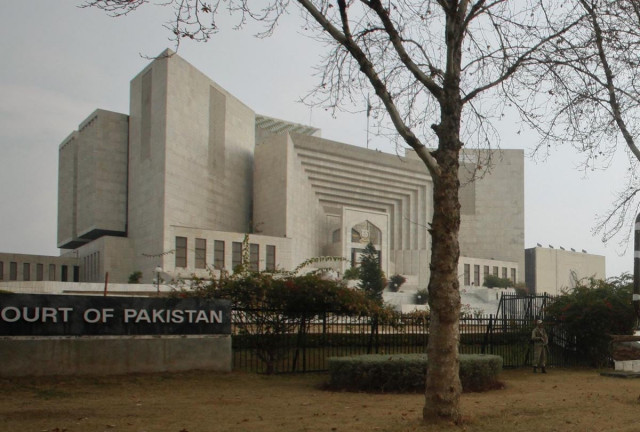Illegal Dispossession Act: Illegal occupants will serve a decade in jail, says SC
Apex court overrules nine-year-old LHC judgement

“Anyone found committing the offence described in Section 3 would be amenable to prosecution under the provisions of the Illegal Dispossession Act-2005 and no past record of the accused needs to be gone into by the court,” says the judgment. PHOTO: REUTERS
A five-justice bench headed by Chief Justice of Pakistan Anwar Zaheer Jamali, setting aside a Lahore High Court ruling, observed that “no provision of the Illegal Dispossession Act-2005 imposes any precondition on the basis of which a particular class of offenders could only be prosecuted”.
The LHC on January 19, 2007 ordered that a complaint was maintainable under the act only if the accused possesses all credentials and antecedents of being a land grabber or member of a qabza group. Otherwise, all illegal occupants would be tried under ordinary civil law.
The 12-page verdict has been endorsed by other judges of the bench -- including SHC Chief Justice Faisal Arab.
The court held that the act was aimed at granting efficacious relief to lawful owners and occupiers in case they are dispossessed by anyone without lawful authority.
The judgment added that the court has to see whether the accused nominated in the complaint has entered into or upon the property in dispute in order to dispossess, grab, control or occupy it without any lawful authority and nothing else is required to be established by the complainant as no precondition has been attached.
Justice Arab believed that “in our view trial of a case is to be relatable to the property which is the subject matter of the complainant, pure and simple”, adding “any past history of the accused with regard to his act of dispossession having no nexus with the complaint cannot be taken into consideration in order to decide whether the accused stands qualified to be awarded a sentence under the Act or not”.
The court held that once the offence reported in the complaint stands proved against the accused, he (the occupant) cannot escape punishment under the Illegal Dispossession Act-2005.
“In our society, the acts of illegal dispossession are largely committed at the behest of persons who are rich, powerful feudal lords, politicians, builders, government functionaries or persons who head large communities, and on account of their influence and power that place them in domineering positions either over their fellow community members or over less powerful communities living in an area of their influence,” the judgment says.
It further observed that “in terms of the ratio of the second set of cases, not every influential, rich or powerful person, who illegally grabs someone’s property, is amenable to the provisions of the Illegal Dispossession Act-2005 unless, as a condition precedent, he possesses the credential and antecedents of ‘land grabber’ or ‘Qabza Group’ or ‘Qabza Mafia’.
It is also stated that before the Illegal Dispossession Act-2005 was enacted, any one, who illegally dispossessed a lawful owner or occupier, used to face either civil litigation which takes years together before justice is delivered.
“Anyone found committing the offence described in Section 3 would be amenable to prosecution under the provisions of the Illegal Dispossession Act-2005 and no past record of the accused needs to be gone into by the court,” says the judgment.
Published in The Express Tribune, July 20th, 2016.



















COMMENTS
Comments are moderated and generally will be posted if they are on-topic and not abusive.
For more information, please see our Comments FAQ